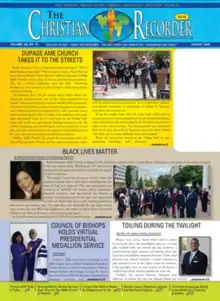The Christian Recorder
The Christian Recorder is a monthly African-American newspaper. It is the official newspaper of the African Methodist Episcopal Church and the is oldest continuously published African-American periodical in the United States.[1] It has been called "arguably the most powerful black periodical of the nineteenth century." at a time when there were very few sources for news and information about Black communities[2][3]

 The Christian Recorder, August 2020 | |
| Type | Monthly newspaper |
|---|---|
| Editor | John Thomas III |
| Founded | 1854 |
| Headquarters | 1722 Scovel Street Nashville, TN 37208 |
| ISSN | 1050-6039 |
| OCLC number | 14096028 |
| Website | www |
The Recorder covered secular as well as religious news, and reported news of the black regiments involved in the Civil War, espousing vocal support for Union troops.[3][4] It was also known for having an Information Wanted section where forcibly-separated Black families could seek news about their missing loved ones.[5] The paper's coverage included birth, marriage, and death notices, but also music, poetry and reader stories and was "a major source of literature by and for African-Americans" during this time period. [6] The paper published the 31 serialized chapters of Julia C. Collins' novel in 1865, as well as many of her essays.[3] It also printed works by Francis Ellen Watkins Harper and James W. C. Pennington.[7][2]
History
The Christian Recorder was originally a weekly paper called the Mystery, later The Christian Herald, started by Rev. Augustus R. Green in Pittsburgh, Pennsylvania[1][3] The name was changed to The Christian Recorder in 1854 under the editorship of Rev. J.P. Campbell.[1][4] The paper strived to cover all geographic areas of the us, but regional versions also sprung up including the Southern Christian Recorder, the Western Christian Recorder, and the Southwestern Christian Recorder. In 1952 the paper's headquarters moved to Nashville, Tennessee. In 1960 the Southwestern Christian Recorder and The Christian Recorder combined to form The AME Christian Recorder. In 1984, the regional papers reverted to using the original name The Christian Recorder.
References
- "History". The Christian Recorder. 2016-09-15. Retrieved 2020-12-25.
- Cohen, Lara Langer (Fall 2016). "Review: Eric Gardner. Black Print Unbound: The Christian Recorder, African American Literature, and Periodical Culture". African American Review. 49 (3): 286–289. doi:10.1353/afa.2016.0042. Retrieved 25 December 2020.
- Kachun, Mitch (Winter 2006). "Interrogating the Silences: Julia C. Collins, 19th-Century Black Readers and Writers, and the 'Christian Recorder.'". African American Review. 40 (4): 649–659. Retrieved 25 December 2020.
- "The Christian Recorder". Accessible Archives Inc. 2020-12-19. Retrieved 2020-12-25.
- "The Christian Recorder". Internet Archive. 2020-06-10. Retrieved 2020-12-25.
- "Julia C. Collins". Recovering 19th-Century American Women Writers. 2015-04-21. Retrieved 2020-12-25.
- Collins, Julia (2020-06-10). "The curse of caste, or, The slave bride". Internet Archive. Retrieved 2020-12-25.